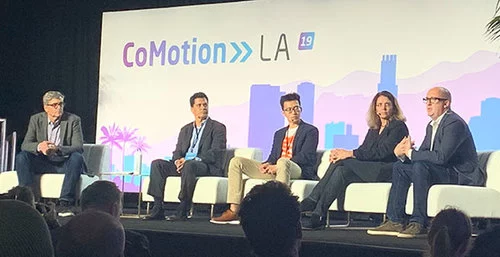
A few weeks ago, I had the privilege of again attending CoMotion LA. Spearheaded by John Rossant, CoMotion LA brings together leaders and innovators of new solutions to solve the mobility issues of our modern world. One of the central themes was adopting new mobility solutions to relieve congestion, an increasingly prevalent reality as populations in cities continue to grow.
During the panel on “Financing the Future: Public-Private Partnering for New Mobility Solutions,” a panel comprised of representatives from the Canadian electric school bus manufacturer Lion Electric, the shared electric scooter company Spin, the City of Pittsburgh, and the City of Detroit discussed how reliance on the gas tax is an unsustainable solution for funding transportation and mobility solutions. Revenue from federal, state, and, possibly local (depending on where you live) taxes generally go into a trust fund that pays for transportation and/or highway projects. However, revenues have been falling short for a while now and the solution is not to continually respond with raising gas taxes to make up for the shortfall.
As discussed on the panel, governments are having discussions with new mobility technology companies to address challenges such as first/last mile transport. However, when choosing the right innovation to implement, public agencies need to be mindful of integrating new mobility solutions in an equitable manner. This can be two-fold: (1) utility – a large proportion of the population, if not everyone, should be able to be use the new mobility technology to avoid marginalizing certain population sectors, and (2) accessibility – new mobility technology should be equally accessible to a large proportion of the population, if not everyone, on the same platform to avoid marginalizing certain population sectors.
The biggest message I took home from the CoMotion LA was that while mobility innovators are anxious to rapidly change the future of transportation, in order to work together with the public sector, new mobility innovators will need to demonstrate how their solution truly fills mobility gaps that are holding back large segments of the population. One of the solutions that is gaining momentum is microtransit. Nossaman is currently assisting LA Metro with its MicroTransit Pilot Project, a first of its kind public-private partnership. LA Metro has entered into contracts with three private entities who will provide customers with on-demand rides through an app or call center for first/last mile trips.
With the public sector looking to solve their transportation problems, tapping the capabilities and resources of private companies and working with them is shaping out to be the future of new mobility.
Nossaman’s 30-plus infrastructure attorneys offer clients, colleagues, strategic partners and industry media a wealth of practical experience, insider insight and thoughtful analysis here on Infra Insight. We blog about what we know best, from industry-leading procurements to local and national policy developments that affect the market and our clients.
Stay Connected
 RSS Feed
RSS Feed
Categories
- Airports
- Alternative Project Delivery
- Bridges
- California Environmental Quality Act
- Cybersecurity
- Design-Build
- Financing
- High-Speed Rail
- Job Opening
- Legislation
- News
- P3s
- Policy
- Ports
- Rail and Transit
- Social Infrastructure
- Tollroads/ Turnpikes/ Managed Lanes
- Transportation Infrastructure
- Tunnels
- Water
